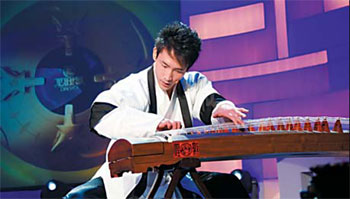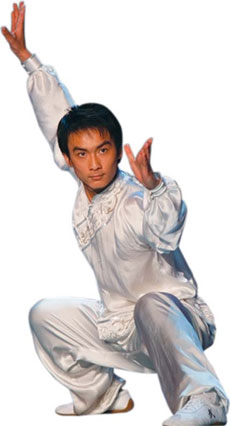Initiated by Jackie Chan, The Disciple show
gathers martial arts lovers from across the world. File
photos
"You can't change anyone with fists," Jerry Liau says, quoting
the consummate kungfu star Bruce Lee. "Martial arts are about
respect, not attack."
Born and raised in New York, the 20-year-old Chinese-American
made his first trip to China last September as a contestant on The
Disciple, a TV show backed by Jackie Chan to find young kungfu
hopefuls and promote Chinese martial arts to the world.
Liau is one of the nearly 100,000 candidates attracted to kungfu
stardom and a possible role in one of Chan's upcoming movies,
according to Beijing TV Station (BTV), one of the organizers.
"I love performing. It would be great (starring in Chan's
movies)," Liau says, "but it's also exciting to see real Chinese
growing and living in the motherland."
There was culture shock, at first, when he was offered animals
he doesn't normally eat at the dinner table.
"But my sifu (master) told me never fear to try," he says.
Shi Yanjie, one of the contestants, plays the
guzheng at the talent show session.
Liau knew little about Chinese culture until, aged 10, he
started to learn kungfu from his master, Henry Moy, to whom he was
introduced by a friend. After two years, Liau became one of Moy's
60 disciples.
When he was 16, Liau's parents separated. The relationship with
his master, he says, was like that of a father and son.
"There is a period in every boy's life when he is tempted to do
something wrong, but my sifu kept me on the right path and taught
me what it takes to be a real person."
Liau says his greatest influences are his parents, siblings and
master. "You get support from them and you give back your
support."
At kungfu school they looked up to Guangong, an ancient Chinese
general. Moy also told him that martial arts are not about the
strong beating the weak, but respect and patience.
"Kungfu also means time in Chinese. You have to train a lot
before you gain," Liau says.
Another believer in "no pain no gain" is Jack Tu, a 23-year-old
champion of many martial arts competitions, including the San Diego
Grand National and Santa Clara Ultimate.
Raised in a family respecting the traditions of martial arts, Tu
grew up on an island near Grouse Mountain in Richmond, Canada. As a
young boy he exercised in the mountains every day. His father, also
a kungfu master, told him not to harm living things, even grass,
because martial arts should be used to protect the weak.
At home Tu was forced to speak Chinese, or his parents would
yell at him. He learned calligraphy, ink painting and guqin, or
Chinese piano. At first he was bored, but when he discovered the
common things between music, calligraphy and martial arts, he
started to enjoy it.
"Martial and arts cannot be separated. In Chinese culture they
are connected. For example, playing Chinese piano needs a lot of
concentration, but the rhythm should not stop. This is also the
case with calligraphy."
Tu took part in The Disciple to interact with Chinese people,
after practicing so long on his own in mountains and forests.
"Friends call me monkey," he jokes.
The Disciple presents a visual feast of Chinese
martial arts.
Three years ago, Tu broke his leg in a competition. He did not
know whether he would be able to practice kungfu again. Instead of
giving up, however, he tied chains on his upper body and ran with
them. When he felt pain he tightened the chains.
"When I felt the pain, I felt how those beaten by me felt. I
found what I thought before was stupid and childish," he says.
When he eventually recovered, he re-entered the competition and
won five gold medals. He said he was not proud of beating others,
but was proud instead of overcoming himself.
Shi Yanjie, 28, was a senior disciple in the Shaolin Kungfu
Troupe. When he was 4, the mischievous boy made a broadsword out of
iron sheeting and hit his brother, hurting his neck.
His parents sent him to the Shaolin temple in the hope that it
would keep him well-behaved and give him life skills.
Each morning Shi would "rush the mountain" by running and
crawling over it, whatever the weather. After a year his parents
visited and he burst into tears when they were 30 m away.
"Shaolin temple is such an important place in my life. The
masters not only make you exercise all the time, they will help you
surpass yourself," Shi says.
Shi says his principles are: Don't attack others, even if they
attack you; try to bear hardship; lead a simple life; remember
there will always be someone stronger.
At 19, Shi left the troupe because he wanted to make more money
to support his family. He set up his own group, does occasional TV
shows and has created various signature kungfu moves.
The Disciple will give him more opportunity with big projects,
he says.
Shi, Liau and Tu are good friends now. Naturally, most of the
contestants competing to appear in the 36-person final are martial
arts lovers. In the show's training camp, they exercise together
and talk about their kungfu experiences.
"Maybe there will be another Jackie Chan, Bruce Lee or Jet Li
among us - as Chan is hoping," Shi says. "But the important thing
is, we are sharing what we've learned from martial arts spirit with
more people."
(China Daily January 23, 2008)




